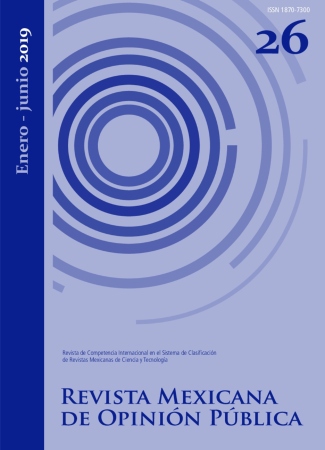The Role of Social and Personal Emotions in Political Participation
Main Article Content
Abstract
The paper analyzes the influence of emotions, affects and feelings upon political participation, be it traditional o social. We used a qualitative approach for studying the social mobilizations of 2014, linked to the Ayotzinapa case and the anti-Trump protest in February 2017, as well as a quantitative approach in a panel research on reported emotions before and after the July 2018 elections. The main finding is that both social and socialized emotions as well as personal emotions have an important role in the political participation of the citizens. We also describe which emotions were publicly expressed since the first mobilizations in May 2012, and how they changed up to 2018: they passed from anger, to fear, frustration and moved to hope and tranquility after the 2018 election. A limitation of the study is that it considers, on one side, the social and socialized emotions for the case of social mobilizations and, on the other side, the personal emotions in the case of the electoral campaign; though we should consider the need to more theoretical and conceptual work in the topic of emotions.
Article Details
References
AHMED, Sara, The Cultural Politics of Emotions, 2a ed., Edinburgh University Press, Edimburgo, Reino Unido, 2014, p. 9.
ARFUCH, Leonor, “El "giro afectivo". Emociones, subjetividad y política”, DeSignis, núm. 24, Federación Latinoamericana de Semiótica, París, Francia, 2016, pp. 245-254.
ATHANASIOU, Athena, HANTZAROULA, Pothiti y YANNAKOPOULOS, Kostas, “Towards a New Epistemology. The "Affective Turn"”, Historein, vol. 8, Cultural and Intellectual History Society, Atenas, Grecia, 2009, pp. 5-16. DOI: http://dx.doi.org/10.12681/historein.33.
AYOUB, Philip, WALLACE, Sophia J. y ZEPEDA MILLÁN, Chris, “Triangulation in Social Movement Research”, en PORTA, Donatella DELLA (ed.), Methodological Practices in Social Movement Research, Oxford University Press, Oxford, Reino Unido, p. 68.
BALSIGER, Philip y LAMBELET, Alexander, “Participant Observation,” en PORTA, Donatella DELLA (ed.), Methodological Practices in Social Movement Research, Oxford University Press, Oxford, Reino Unido, 2014, pp. 144-172.
BARBALET, Jack, Emotions, Social Theory and Social Structure. A Macrosociological Approach, Cambridge University Press, Cambridge, EE. UU., 1998, pp. 12-18. DOI: https://doi.org/10.1017/CBO9780511488740.
BARBALET, Jack, “Introduction. Why Emotions are Crucial”, Sociological Review, vol. 50, núm. S2, Blackwell Publishers, Oxford, Reino Unido, 2002, pp. 4-5. DOI: https://doi.org/10.1111/j.1467-954X.2002.tb03588.x.
BECERRIL, Jorge, “Marchas a la Suprema Corte por caso Ayotzinapa”, Milenio, Grupo Milenio, Ciudad de México, México, 26 de junio, 2018. Disponible en < http://www.milenio.com/ciudad/marchan-a-la-suprema-corte-por-caso-ayotzinapa >.
BIANCHI, Alison J., “Emotions and Sociology”, Contemporary Sociology, vol. 33, núm. 3, SAGE, New Hampton, EE. UU., 2004, pp. 313-314. DOI: https://doi.org/10.1177/009430610403300327.
BUCK COLEMAN, Audra, “Anger, Profanity and Hatred”, Contexts, vol. 17, núm. 1, American Sociological Association, Washington D. C., EE. UU., 2018, pp. 66-73.
GANDHI, Leela, Affective Communities. Anticolonial Thought, Fin-de-Siécle, Radicalism and the Politics of Friendship, Duke University Press, Durham, Carolina del Norte, EE. UU ., 2006.
GODWIN, Jeff, JASPER, James M. y POLLETTA, Francesca, “The Return of the Repressed. The Fall and Rise of Emotions in Social Movement Theory”, Mobilization. An International Quarterly, vol. 5, núm, 1, Universidad de Carolina del Norte, Carolina del Norte, EE. UU., 2000, pp. 65-83.
Hoggett, Paul y SIMPSON, Simon, “Introduction”, en HOGGETT, Paul y SIMPSON, Simon (eds.), Politics and Emotions. The Affective Turn in Contemporary Political Studies, Bloomsbury, Nueva York, EE. UU., 2012.
HUTCHINSON, Emma, Affective Communities in World Politics. Collective Emotions After Trauma, Cambridge University Press, Cambridge, Reino Unido, 2016.
JASPER, James M., “¿De la estructura a la acción? La teoría de los movimientos sociales después de los grandes paradigmas”, Sociológica, año 27, núm. 75, Universidad Autónoma Metropolitana-Azcapotzalco (UAM-A), Ciudad de México, México, 2012, pp. 7-48.
JASPER, James M., “Constructing Indignation. Anger Dynamics in Protest Movements”, Emotion Review, vol. 6, núm. 3, SAGE-International Society for Research on Emotion, San Diego, California, EE. UU., 2014, pp. 208-213. DOI: https://doi.org/10.1177/1754073914522863.
JASPER, James M., “Las emociones y los movimientos sociales. Veinte años de teoría e investigación”, Revista Latinoamericana de Estudios sobre Cuerpos, Emociones y Sociedad, núm. 10, año 4, Centro de Investigaciones y Estudios sobre Cultura y Sociedad (CIECS),CIECS, Córdoba, Argentina, 2013, pp. 48-68.
LARA, Alí y ENCISO DOMÍNGUEZ, Giazú, “El Giro Afectivo”, Athenea Digital, vol. 13, núm. 3, Universidad Autónoma de Barcelona, Barcelona, España, 2012, pp. 101-119.
MARCUS, G.E., “Emotions in Politics”, Annual Review of Political Science, vol. 3, Annual Reviews, California, EE. UU., 2000, pp. 221-250. DOI: https://doi.org/10.1146/annurev.polisci.3.1.221.
MASSAL, Julie, “Emociones y movilización social: un cuestionamiento al paradigma racionalista”, Análisis Político, vol. 28, núm. 85, Universidad Nacional de Colombia, Bogotá, Colombia, 2015, pp. 93-111. DOI: https://doi.org/10.15446/anpol.v28n85.56249.
OPPENHEIM, A.N., Questionnaire Design, Interviewing and Attitude Measurement, Bloomsbury, Nueva York, EE. UU., 1994, pp, 236-237. DOI: https://doi.org/10.1002/casp.2450040506.
PASSERINI , Luisa, “Connecting Emotions. Contributions from Cultural History”, Historein, vol. 8, Cultural and Intellectual History Society, Atenas, Grecia, 2009, pp. 117-127. DOI: http://dx.doi.org/10.12681/historein.44.
PLOWS, Alexandra, “Social Movements and Ethnographic Methodologies. An Analysis Using Case Study Examples”, Sociology Compass, vol. 2, núm. 5, John Wiley and Sons, Nueva Jersey, EE. UU., 2008, pp. 1523-1538. DOI: https://doi.org/10.1111/j.1751-9020.2008.00091.x
PORTA, Donatella DELLA, “Social Movement Studies and Methodological Pluralism: An Introduction,” en PORTA, Donatella DELLA (ed.), Methodological Practices in Social Movement Research, Oxford University Press, Oxford, Reino Unido, 2014, pp. 1-20. https://doi.org/10.1093/acprof:oso/9780198719571.003.0001.
SCHEVE, Christian VON y LUEDE, Rolf VON, “Emotion and Social Structure. Towards an Interdisciplinary Approach”, Journal for the Theory of Social Behaviour, vol. 35, núm. 3, Wiley, Nueva Jersey, EE. UU., 2005, pp. 303-328.
TENHOUTEN, Warren, “Introduction: Sociology of Emotions”, International Journal of Sociology and Social Policy, vol. 16, núms. 9-10, Emerald Group Publishing, West Yorkshire, Reino Unido, 2016, pp. 1-20. DOI: https://doi.org/10.1108/eb013267.

Revista Mexicana de Opinión Pública por Universidad Nacional Autónoma de México se distribuye bajo una Licencia Creative Commons Atribución-NoComercial-SinDerivar 4.0 Internacional.
Basada en una obra en http://revistas.unam.mx/index.php/rmop.
